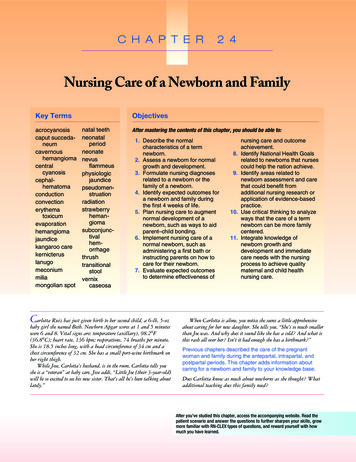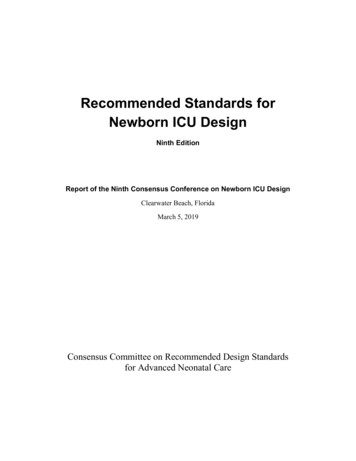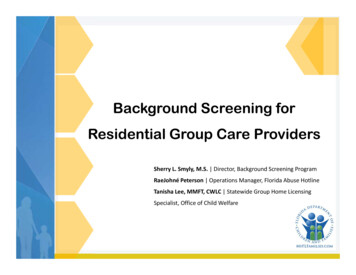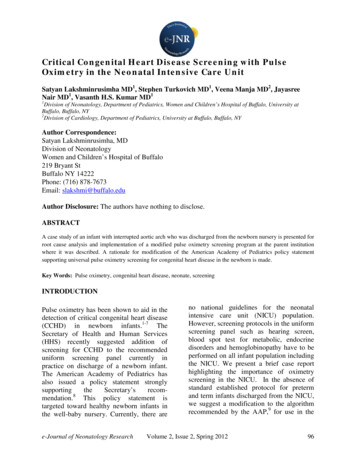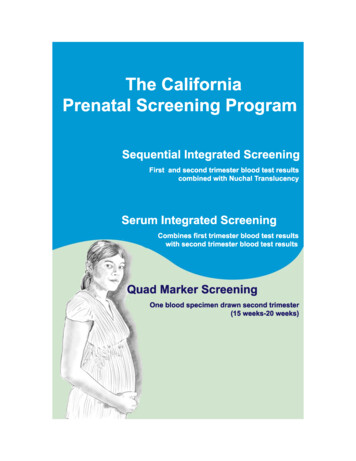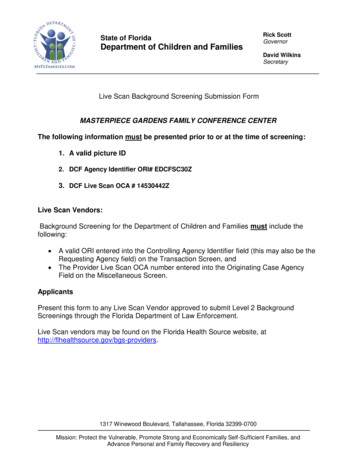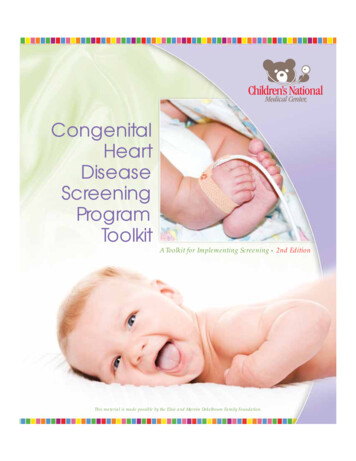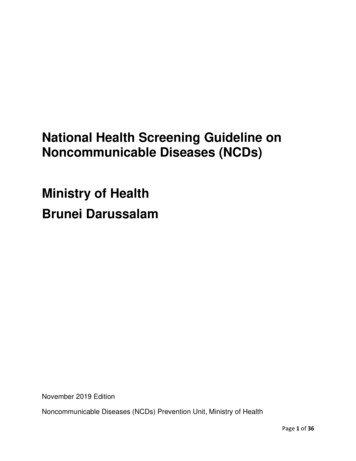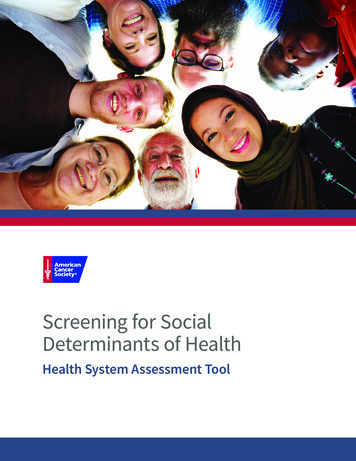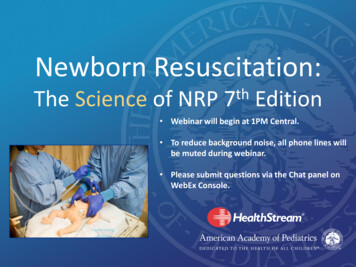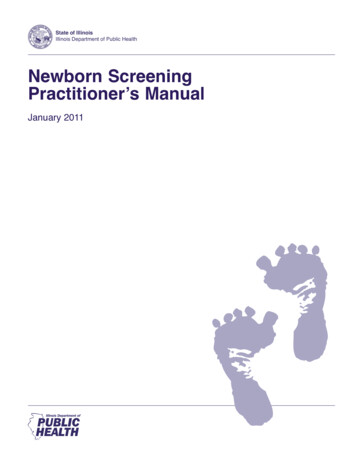
Transcription
State of IllinoisIllinois Department of Public HealthNewborn ScreeningPractitioner’s ManualJanuary 2011
Table of ContentsIntroductionOverviewList of Disorders Included in Illinois Screening PanelNewborn Screening Program Contact InformationPage 11-234Practitioner’s Newborn Screening ResponsibilitiesSpecimen CollectionNewborn Screening FeeRepeat Specimens, Diagnostic Testing and ReferralsRefusal of Newborn ScreeningInfants Born Outside State of Mother’s ResidencePages 5-75-66667Collection of Newborn Screening SpecimensFilter Paper Collection FormTiming of Specimen CollectionExceptionsSpecial ConsiderationsInfants Born Outside of Hospital/Medical FacilitiesPremature and Sick InfantsInfants Receiving Special FeedingsInfants Receiving AntibioticsTransfusionsTips for Specimen CollectionCapillary Tubes and EDTACollection of Repeat SpecimensPages 7-117-88Handling and Submission of SpecimensSubmitting SpecimensTimelinessPage 111111Reporting of Screening ResultsNormal ResultsAbnormal ResultsPresumptive Positive Abnormal ResultsSuspect Abnormal ResultsUnsatisfactory SpecimensPage 12-1312128-99-1010Referrals to Pediatric Medical Specialists and Other AgenciesPagePediatric Medical SpecialistsServices for Infants with Sickle Cell Disease/Other HemoglobinopathiesUniversity of Illinois Division of Specialized Care for Children (DSCC)Local Public Health Departments12-1313-1413131414
Newborn Screening DisordersAmino Acid/Urea Cycle DisordersBiotinidase DeficiencyCongenital Adrenal HyperplasiaCongenital HypothyroidismCystic FibrosisFatty Acid Oxidation DisordersGalactosemiaOrganic Acid DisordersPhenylketonuria (Also see Amino Acid Disorders)Sickling Hemoglobinopathies (FS, FSC, FSa)Other Hemoglobin Disease Conditions (FC, FD, FE, FNA)and Carrier States (Traits)Lysosomal Storage DiseasesAppendicesFilter Paper Collection FormSample Laboratory Mailer ReportSample Newborn Screening Follow-up Abnormal Results ReportPediatric Medical SpecialistsLocal Public Health Department ContactsTandem Mass Spectrometry - Acylcarnitine/Amino Acid AnalytesPage 38-4041-4243-45Appendix AAppendix BAppendix CAppendix DAppendix EAppendix F
1IntroductionNewborn screening is a public health activity aimed at early identification of newborns affected withcertain genetic and/or metabolic conditions. Early diagnosis and treatment of these conditions has beenshown in many cases to reduce morbidity, premature death, mental retardation and other developmentaldisabilities. Newborn screening is recognized as one of the most successful recent public healthaccomplishments, and was the first population-based genetic screening program to become an integralcomponent of public health practice.While newborn screening disorders are individually rare, collectively the incidence of these disorders isaround one in 500 births. In Illinois, each year around 350-400 babies are diagnosed with a conditionidentified by newborn screening. Newborn screening affects all health care practitioners who workwith children and their families. During their practice of medicine, most pediatric and family medicinehealth professionals will receive a notice that a child in their care has a serious abnormal newbornscreen, or has been diagnosed with a newborn screening disorder.Health care practitioners are vital links within an effective newborn screening system, a system thatincludes hospitals, the state newborn screening laboratory and follow-up program, parents, health careproviders, medical specialists and community service agencies. Health care providers serve as thefront line in assuring that all newborns receive adequate screenings and when necessary, appropriatefollow-up services within a medical home.The Illinois Department of Public Health (Department) Newborn Screening Program developed thismanual for health care professionals as a reference guide to newborn screening in Illinois. Thisresource provides protocols for specimen collection, laboratory testing, follow-up services, and theDepartment’s reporting of both normal and abnormal screening results. Information about thedisorders included in the current newborn screening test panel also is provided. This manual isintended to provide background information and general guidance on issues related to newbornscreening, but does not replace the case specific medical advice available through consult withpediatric medical specialists, including those who may be contacted at the medical centers listed in themanual Appendix.OverviewThe Newborn Metabolic Screening Act (410 ILCS 240/) mandates newborn screening for all infantsborn in Illinois. This act authorizes the Illinois Department of Public Health to promulgateadministrative rules for newborn screening (Title 77: Public Health, Chapter 1: Department of PublicHealth; Subchapter i: Maternal Child Health; Part 661 Newborn Metabolic Screening and TreatmentCode). The Newborn Metabolic Screening Act and the newborn screening administrative rules may beviewed at the Department’s Web site, www.idph.state.il.us.All Illinois newborn infants are mandated to have a blood sample collected on the special filter paperspecimen cards supplied by the Illinois Department of Public Health. The only valid exception isparental refusal based on religious beliefs and practices; in which case, a written refusal must be signedby the parents and documented in the infant’s medical record.
2Newborn screening blood spot specimens should be collected as soon as possible after the first 24hours of life. If the baby is to be discharged from the birth center prior to 24 hours of age, thespecimen should be collected before discharge. After drying, the specimen cards should be sent bycourier to the Department’s Newborn Screening Laboratory in Chicago for testing. When testing iscompleted, a report of all test results is issued by the Department’s Newborn Screening Laboratory tothe specimen submitter (usually the birth center). Birth centers are expected place the originalscreening report in the infant’s medical record and to relay a copy of the results to the baby’s primarycare provider.In addition to this laboratory report, abnormal, unsatisfactory and invalid test results are reported by theNewborn Screening Follow-up Program to the physician of record, the physician whose name appearson the specimen card. In some cases, hospitals may authorize reporting of results to a specifiedhospital contact person. The physician of record or the birthing hospital newborn screening contactperson is expected to inform the mother, and should the baby have a new primary care provider, thenew physician, of the abnormal test results and to facilitate any recommended follow-up activities.Necessary follow-up may include evaluation of the baby’s medical condition and collection of a repeatnewborn screening specimen or referral to a pediatric medical specialist for diagnostic testing. If themother cannot be contacted, the assistance of the birth hospital and/or the local public healthdepartment may be needed to help locate the family. The Department’s Newborn Screening Programshould be informed of any difficulties in locating the family. Every effort should be made to assurethat each baby who has an abnormal newborn screen receives the appropriate follow-up services in atimely manner.In the cases of babies with any abnormal results requiring immediate referral to a pediatric medicalspecialist, a list of Department designated specialists, information about the suspected disorder and theactual test results will be provided to the physician of record or the hospital newborn screening contact.The American College of Medical Geneticists (ACMG), www.acmg.net, provides detailed action plansfor follow-up of suspected newborn screening disorders. The University of Illinois at Chicago,Division of Specialized Care for Children (DSCC), www.uic.edu/hsc/dscc, provides additionalinformation about these conditions and the importance of medical homes for children with specialhealth care needs.In addition to these resources, the Federal Maternal and Child Health Bureau of the Health Resourcesand Services Administration provided grant funding to create the Region 4 Genetics Collaborative,which includes Illinois, Indiana, Kentucky, Michigan, Minnesota, Ohio and Wisconsin. The goals ofthis multi-state collaborative include efforts to address inequities in genetics resources and to improvethe quality of genetics services, including newborn screening throughout the region. The Region 4Genetics Collaborative Web site, www.region4genetics.org, provides information about newbornscreening, medical homes, specialty care resources and genetic counseling services available withinthis seven state region.
3Illinois Newborn Screening Disorder ListAlthough additional disorders may be added as determined by the Illinois Department of Public Healthunder the advisement of the Genetic and Metabolic Disease Advisory Committee, the Illinois newbornscreening panel currently includes the following disorders:Endocrine DisordersCongenital adrenal hyperplasia (CAH)Congenital hypothyroidismHemoglobinopathiesSickle cell disease, trait conditions and other hemoglobinopathiesAlpha thalassemiaBeta thalassemia majorAmino Acid DisordersHomocystinuria (HCU)/HypermethioninemiaMaple syrup urine disease (MSUD)Phenylketonuria (PKU)/HyperphenylalaninemiaTyrosinemia - tyrosine levels may not be sufficiently elevated for detection in first few days of life5-Oxoprolinuria (5OXP) - may not be reliably detected in first few days of lifeUrea Cycle DisordersArgininemia - extremely rareArgininosuccinic aciduria (argininosuccinate lyase deficiency - ASAL)Citrullinemia (argininosuccinate synthetase deficiency - ASAS)Organic Acid Disorders2-methylbutyryl-CoA dehydrogenase deficiency (2MBCD)3-methylcrotonyl-CoA carboxylase deficiency (3MCC)3-hydroxy-3-methylglutaryl-CoA lyase deficiency (HMG)3-methylglutaconic aciduria (3MGA)Beta-ketothiolase deficiency (BKT)Glutaric aciduria, type 1 (GA1)Isovaleric acidemia (IVA)Malonic aciduria (MA) - may not be reliably detected in the first few days of lifeMethylmalonic acidemia (MMA)Multiple carboxylase deficiency (MCD)Propionic acidemia (PA)Fatty Acid Oxidation DisordersCarnitine/acylcarnitine translocase deficiency (CACT) - neonatal form is extremely rareCarnitine palmitoyl transferase deficiency, type 2 (CPT2) - neonatal form is extremely rareCarnitine palmitoyl transferase deficiency, type 1A (CPT1A) - may not be reliably detected in first days of lifeCarnitine uptake defect (CUD) - may not be reliably detected in first few days of lifeGlutaric aciduria, type 2 (GA2)/Multiple acyl-CoA dehydrogenase deficiency (MADD)Isobutyryl-CoA dehydrogenase deficiency (IBCD)Medium chain acyl-CoA dehydrogenase deficiency (MCADD)Medium/Short chain L-3-hydroxyacyl-CoA dehydrogenase deficiency (M/SCHADD)Long chain 3-hydroxyacyl-CoA dehydrogenase deficiency (LCHADD)Short chain acyl-CoA dehydrogenase deficiency (SCADD)Trifunctional protein deficiency (TFP)Very long chain acyl-CoA dehydrogenase deficiency (VLCADD)Other DisordersBiotinidase deficiencyGalactosemia (Classical)Cystic fibrosis (CF)Lysosomal storage diseasesPompeFabryGaucherKrabbeNiemann-Pick
4Important Contact InformationNewborn Screening Follow-up ProgramIllinois Department of Public HealthGenetics/Newborn Screening Program535 W. Jefferson St., Second FloorSpringfield, IL 62761Phone 217-785-8101FAX 217-557-5396Newborn Screening LaboratoryIllinois Department of Public HealthDivision of Laboratories2121 W. Taylor St.*Chicago, IL 60612Phone 312-793-4752FAX 312-793-1054Accounting ServicesIllinois Department of Public HealthAccount Services Billing ManagerPhone 217-782-5934Web SitesIllinois Department of Public Health Genetics/Newborn Screening Program linois Department of Public Health Newborn Screening Laboratory www.idph.state.il.us/a-zlist.htm#N*Note: Newborn Screening Shipping LabelsSpecial courier service shipping labels are available to birthing hospitals. Please contact NewbornScreening Follow-up Program for more information about this service (217-785-8101).All other submitters of newborn screening specimens are highly encouraged to utilize a courier servicefor prompt delivery of these dried blood samples, and shipping labels should be addressed to:Newborn Screening LaboratoryIllinois Department of Public Health2121 W. Taylor St.Chicago, IL 60612
5Practitioner’s Newborn Screening ResponsibilitiesSpecimen Collection Attending physician at birth or in the immediate newborn period has primaryresponsibility for collection of a specimen for newborn screening. The physician’sresponsibility may be delegated to the hospital administrator or the administrator’sdesignee. If the birth is attended by a licensed nurse midwife, the midwife has primaryresponsibility for collection of a specimen for newborn screening. Parents should be informed that a blood specimen will be collected from their infant andprinted information about newborn screening and how parents can access screeningresults should be provided.o Newborn Screening Guide for Parents: Baby's First Steps in Life document isavailable through the Department’s Genetics/Newborn Screening Program. Anelectronic file of this document may be downloaded from the Department’s Website www.idph.state.il.us, and reprinted for distribution.o Documentation that a newborn screening specimen was collected and a copy ofthe screening results should be placed in the infant’s medical record.o Parents should be informed that accurate contact information (emergencycontact, current address and valid phone number) is vital, should their baby’snewborn screening test be abnormal and additional testing or referral of theinfant to a specialist become necessary. Physician or health care provider caring for the infant during the first month of life isresponsible for newborn screening if o Birth occurs outside of a hospital or medical facility.o Birth occurs without a physician or licensed midwife in attendance.The American Academy of Pediatrics, August 2000 supplement to Pediatrics, “ Serving theFamily from Birth to the Medical Home,” suggests that the role of the medical home health careprofessional include establishment of office protocol to retrieve the results of newbornscreening for all newborns admitted to the practice when scheduling the first appointment.When screening results cannot be documented, a newborn screening specimen should becollected from the baby and submitted for testing. The Illinois Department of Public Health encourages primary care practitioners toprovide medical homes, and to facilitate follow-up services for infants with abnormalnewborn screening results.o The Federal Maternal and Child Health Bureau of the Health Resources andServices Administration (HRSA) funded Region 4 Genetics Collaborative Web sitewww.region4genetics.org provides information about newborn screening, medicalhomes, pediatric specialty care resources and genetic counseling services availablewithin this seven state region.
6 Primary care providers have an obligation to verify newborn screening results, andshould not assume lack of notification indicates the baby’s screen was normal.o Reports may be sent to the wrong health care provider.o Specimens may be lost in transit to the Department laboratory.o On rare occasions, hospitals may fail to collect a newborn screeningspecimen prior to hospital discharge or transfer. If there is no physician caring for the infant, the parents are responsible for obtainingnewborn screening for their baby.Newborn Screening Fee A fee will be charged for each specimen submitted to the Department NewbornScreening Laboratory for testing. This fee provides funding for testing, follow-upservices for babies with abnormal results, and provision of certain medically necessarydietary treatment formulas. The Illinois Department of Public Health bills hospitals and health care agencies on amonthly basis for all newborn screening specimens submitted during that month.Repeat Specimens, Diagnostic Testing and Referrals Physician of record or hospital designee is responsible for informing parents and/orinfant’s primary care/medical home provider of abnormal or unsatisfactory test results.If repeat screening is necessary, the physician of record is responsible for obtaining andsubmitting a repeat specimen and/or informing the infant’s primary care provider of theneed for additional testing. If referral of the infant to a pediatric medical specialist is necessary, the physician ofrecord or hospital designee is responsible for assisting the baby’s family and facilitatingthe referral. The Department highly recommends that the physician’s office contact themedical specialist and provide the screening results to assure the referral is completed,and the screening results are accurately reported. Physicians and hospital staff shouldnot refer to the newborn metabolic screen as the “PKU test.” Use of this outdated,inappropriate terminology has often resulted in confusion about newborn screeningresults among primary care providers, medical specialists and parents.Refusal of Newborn Screening Parents may refuse newborn screening only on the basis of religious beliefs andpractices. If parents refuse newborn screening of their infant, parent education about theseriousness of newborn screening disorders should be provided, and the infant’s primarycare provider should be informed about the refusal. A written objection statementshould be signed by the parents and placed in the infant’s medical record, and a copy ofthe statement may be sent to Illinois Department of Public Health, Genetics/NewbornScreening Program.
7Infants Born Outside State of Mother’s Residence Illinois residents whose infants are born in other states may obtain newborn screeningthrough the Department’s Newborn Screening Laboratory. The physician should obtainthe Department’s filter paper specimen forms or order the screening through an Illinoisbirthing hospital. If an initial screening was performed in another state, a secondnewborn screening specimen may be submitted to the Department. Specimens shouldbe collected and submitted as soon as possible after 24 hours of age. Newbornscreening of infants older than 6 months of age is not recommended as the Department’snormal values are based on normal analytes, distributions and controls for newborns. Inthese cases, a consultation with a pediatric sub-specialist is recommended. Infants born in Illinois whose mothers reside in another state must have a specimen sentto the Department’s Newborn Screening Laboratory. Illinois provides screening for 29of the disorders currently recommended by the American College of MedicalGeneticists and the U.S. Centers for Disease Control and Prevention, plus severaladditional disorders, but parents who choose to are free to obtain a second screeningwithin their state of residence.Collection of Newborn Screening SpecimensFilter Paper Collection Form Only Department filter paper specimen collection forms are accepted by theIllinois Department of Public Health Newborn Screening Laboratory. The U.S.Food and Drug Administration now requires printed expiration dates on specimencards, and health care providers are advised to check the card prior to specimencollection. See Appendix to view a copy of the Department collection form. Newborn screening filter paper specimen collection forms may be requested bycontacting the Department’s Division of Laboratories Springfield office, 217524-6222 by phone, or may fax a request with appropriate contact information to217-524-7924. Filter paper specimen cards should be stored in a cool, dry location out of directsunlight. Cards should be stored in their original wrappings and stacked in amanner that avoids compressing the paper. When properly stored specimen cardshave a shelf life of around two years. However, each card has a printed expirationdate and once expired, the specimen cannot be considered valid. When expiredcards are received, although testing is performed, the Department must issue areport requesting submission of a new sample for a valid screening. Birth history and identifying information requested on specimen collection formsshould be complete, legible and accurate. Accurate personal health information is crucial to valid and reliable testing.
8 Accurate personal contact information is vital to the physician for identifying theinfant and contacting the parents, should abnormalities be detected in the bloodsample.Timing of Specimen Collection Newborn screening specimen collection from healthy newborns should occur assoon as possible after 24 hours of age. All newborns should have a samplecollected within the first 24-48 hours of life. Specimens should not be collectedprior to 24 hours of age with the exception of special circumstances. Special circumstances include:o Early discharge: If the infant is to be discharged at less than 24 hours ofage, collect specimen prior to discharge. Inform parents that infant mustbe rescreened during the second day of life.o Transfers: If the infant requires transfer to another facility, if at allpossible, a specimen should be collected prior to transfer, regardless ofinfant’s age. If a specimen cannot be collected prior to transfer due to themedical instability of the neonate, the transferring facility is responsiblefor informing the admitting facility of the need for specimen collectionprior to transfusion and/or within first 24-48 hours of life.o Transfusions: If the infant requires transfusion, specimen should alwaysbe collected prior to transfusion, regardless of infant’s age.o Premature and sick infants: See Special Considerations section below. If a specimen is collected prior to 24 hours of age, repeat specimen collection isnecessary as soon as possible during the second day of life.Special Considerations Infants born outside of hospital/medical facilities: These infants should have aspecimen collected at 24-48 hours of age. Premature and sick infants: If the infant’s condition is medically unstable, thespecimen should be collected at 24-48 hours of age.o All infants admitted to a neonatal intensive care unit (NICU) or special carenursery should have a routine second specimen collected at 14 days of age orprior to discharge from the unit, whichever comes first.o The “NICU” check box on the specimen card should be marked on specimensfrom all infants admitted to a NICU or special care nursery. Retest box shouldbe marked for all repeat specimens.
9 Infants receiving special feedings: Infants requiring soy formula,hyperalimentation or total parenteral nutrition (TPN), and those not yet receivingmilk (galactose) feedings at the time of specimen collection requiredocumentation of feeding type or status on the specimen card.o The feeding type box should be clearly marked for “breast,” “soy,” “other,”“TPN” or “NPO” (nothing by mouth). This information is important tonewborn screening laboratory staff and the baby’s physician should anabnormality be detected.o Soy formula or lack of milk feeding will affect screening for galactosemia.o Hyperalimentation and TPN may affect tandem mass spectrometry screeningfor some amino acid, fatty acid oxidation and organic acid disorders. If screening results suggest TPN effects, another specimen is requestedwhen the infant has been off TPN for 48 hours, or on day 14 of life ifthe baby was admitted to NICU or special care nursery. Infants receiving antibiotics: When infants are receiving antibiotics at the time ofspecimen collection, the “antibiotic” box of the specimen collection card shouldbe marked, as the presence of antibiotics and some other medication metabolites(valproic and benzoic acids) may be detected by tandem mass spectrometry. Inthese cases, a repeat sample will be requested. Transfusions: Collect initial specimens prior to transfusion, if at all possible. Ifthis is not possible and the infant was transfused prior to specimen collection,indicate the last transfusion date prior to the specimen collection on the filterpaper collection form.o Transfusions will invalidate screening for classical galactosemia.o Transfusions will invalidate screening for biotinidase deficiency.o Transfusions will invalidate screening for hemoglobinopathies.o Specimen collection immediately after transfusion will affect all newbornscreening results. If a post-transfusion specimen is necessary, collectionshould be delayed for 48 hours post-transfusion.o If the infant’s initial specimen was collected post-transfusion, a secondspecimen should be collected 48 hours post-transfusion, and a thirdspecimen is required 90 days after the final transfusion.Tips for specimen collection Electronic copies of the newborn screening specimen collection posters “NeonatalScreening: Blood Specimen Collection and Handling Procedure” and “SimpleSpot Check” are available for download and printing through theGenetics/Newborn Screening Program, or for purchase through the ClinicalLaboratory Standards Institute (CLSI). These posters provide an excellenttraining resource.
10 The Genetics/Newborn Screening Program has provided to each PerinatalNetwork a copy of the Clinical Laboratory Standards Institute (CLSI) document,“Blood Collection on Filter Paper for Neonatal Screening Programs; ApprovedStandard”(LA4-A4) which is available on loan to birth centers. Heel stick is the preferred mode of collection for newborn screening wheneverpossible. If heel stick is not possible, use of a syringe to collect blood from an umbilicalcatheter is recommended by the CLSI.o If heel stick is not a viable option, see CLSI recommended procedures forspecimen collection, Approved Standard LA4-A4.o Some screening results may vary slightly between heel stick specimens andvenous or capillary specimens. Collection of specimens in capillary tubes is not recommended by the CLSI.o Heparinized capillary tubes should only be used when heel stick orcollection by syringe is not possible.o Use extreme caution when applying a blood sample to the filter paper viacapillary tubes. Caution is needed to prevent damage to filter paper and avoid“layering.” Uniform application of the blood sample is required.o Layering can affect the validity and reliability of screening results. If heelstick is not an option, see the CLSI recommended procedures for specimencollection. EDTA anticoagulant should never be used for newborn screening specimencollection and will invalidate screening results and may cause false negative orfalse positive results.Collection of Repeat specimens Repeat screening is requested by the Department when results of the originalspecimen were borderline abnormal, the specimen was declared unsatisfactory fortesting, or declared invalid due to delayed submission or incomplete informationon the specimen card. Routine repeat screening also is required for all infants admitted to the NICU orspecial care nursery. See Section “Special Circumstances – Premature and SickInfants.” Submitters should mark the retest box on the specimen card. Submitters should provide adequate information to allow matching of any retestspecimens to the infant’s original newborn screening record. All known names ofthe infant (beginning with the birth name), the mother’s full name, date of birthand the infant’s medical record number will greatly assist Newborn ScreeningProgram staff in matching specimens.
11Handling and Submission of Newborn Screening SpecimensSubmitting Specimens It is highly recommended that completed newborn screening specimen collectionforms be air dried for a minimum of three hours and submitted to the Departmentlaboratory for testing within 24 hours of collection using a courier service. For details about the latest recommendations for specimen submission contact:Illinois Department of Public HealthGenetics/Newborn Screening Program535 W. Jefferson St., Second FloorSpringfield, IL 62761 Currently, all Illinois birthing hospitals may utilize the Department supportedcourier service for pickup of newborn screening specimens and shipment to theChicago Newborn Screening Laboratory. Contact the Newborn Screeningprogram 217-785-8101 for more information about this service.Timeliness Specimens should be submitted to Department Division of Laboratories on adaily basis, during regular business days Monday through Friday. SaturdayUPS courier service pickup of specimens for next business day delivery alsois available to birthing hospitals, but must be requested 24 hours in advance andarranged with the courier service. For more information contact the NewbornScreening Program 217-785-8101. Newborn screening disorders are serious and can be life threatening, thereforeearly detection and treatment is vital. Failure to submit specimens promptly mayunnecessarily delay detection and treatment of affected infants. Batching ofspecimens from multiple collection days is unacceptable. Tracking courier service delivery of specimens to the Department’s NewbornScreening Laboratory is the responsibility of birthing hospitals. Please contact theNewborn Screening Program at 217-785-8101 for more information abouttracking deliveries and reporting courier service problems. Reports on the timeliness of specimen delivery for each hospital submittingspecimens to the Department are available through the Newborn ScreeningProgram.
12Reporting of Screening ResultsNormal Results Reported by written laboratory mailer sent to the submitting facility or submittingagent when testing is completed.Abnormal Results Newborn screening is not diagnostic. Abnormal screening results are designatedby Department laboratory staff as “presumptive positive” abnormal or “suspectborderline” abnormal. Presumptive positive abnormal: Indicates with high probability that the infantmay have a disorder. Newborn S
While newborn screening disorders are individually rare, collectively the incidence of these disorders is around one in 500 births. In Illinois, each year around 350-400 babies are diagnosed with a condition identified by newborn screening. Newborn screening affects all health care practitioners who work with children and their families.
